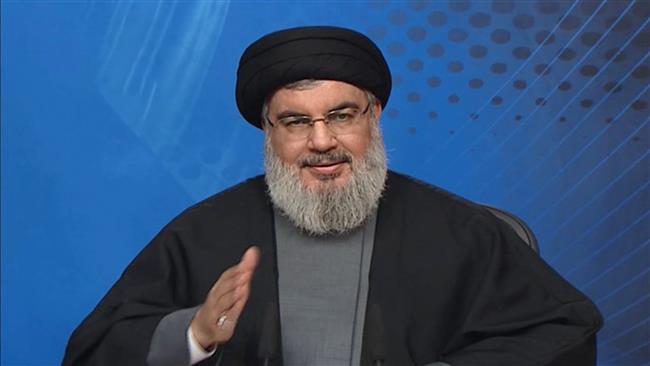
RNA – Speaking in an exclusive interview with al-Manar on Friday, Nasrallah said he is “confident” that Hezbollah “would emerge victorious from any new war with Israel.”
“After the (2006) war, I visited the Beqaa Valley and southern Lebanon. They (Israelis) say their achievement is that they forced me to hide in a bunker. That’s not true; I’ve met with many people away from the spotlight. I live and get around in a natural way. I do not live in a bunker,” the Hezbollah chief said.
He said the missiles that Hezbollah fired against Israel during the 2006 war came from the Syrian military industry, and they were not manufactured in Iran.
“The war was aimed at eliminating the resistance in Lebanon, Syria and Palestine, and eventually isolating Iran. What is happening in Syria is a form of revenge for that war,” he said, referring to the foreign-backed militancy against the government of Syrian President Bashar al-Assad.
“The Israelis knew that a direct military confrontation would not lead to Hezbollah’s defeat and that a war with Iran was not helpful. That is why they chose to take out Syria from the axis of resistance,” Nasrallah said.
He said some parties in Lebanon “tried to confine the Lebanese army” during the 2006 war.
Nasrallah reiterated Hezbollah’s commitment to Lebanon’s national unity and the formation of a government that included all Lebanese political parties and factions, including the Future Movement.
About 1,200 Lebanese, most of them civilians, lost their lives during Israel’s 33-day war on Lebanon back in the summer of 2006.
According to the 629-page Winograd Report by the Israeli regime itself, Hezbollah fighters involved in defending Lebanon against the Israeli war defeated the enemy and Tel Aviv was compelled to withdraw without having achieved any of its objectives.
UN Security Council Resolution 1701, which brokered a ceasefire in the 2006 war, calls on Israel to respect Lebanon’s sovereignty and territorial integrity.
Earlier, on the occasion of the 10th anniversary of Lebanon’s victory against Israel in the 33-day war last Saturday, Nasrallah said the Israeli military was shaken after the 2006.
He said generals in the Israeli military began to accuse each other of various faults after the defeat in the war.
Hezbollah fighters as well as the Lebanese military have been defending Lebanon on the country’s eastern border against foreign-backed terrorist groups from neighboring Syria.
Israel plotting another war?
Israel has launched two wars on Lebanon — one in 2000 and another in 2006. About 1,200 Lebanese, most of them civilians, lost their lives during the 33-day war in the summer of 2006. Hezbollah is credited with driving Israeli troops out of southern Lebanon.
Earlier, in 1967, the Israeli regime fought with Egypt, Jordan and Syria. During that war, the regime also occupied the nearby Lebanese territory of the Shebaa Farms.
On Thursday, Hezbollah warned against the ongoing construction of a road by Israel in the Shebaa Farms. A day later, people from southern Lebanon entered the Israeli-occupied Shebaa Farms and raised the Lebanese flag in protest at the construction of the road.
Forces from the UN, which are stationed in the area to monitor ceasefire, as well as the Lebanese and Israeli military forces went on high alert as the demonstrators crossed into the occupied territory. The Israeli regime deployed around 500 Israeli troops to an area about three kilometres away from the protesters. Israeli snipers were also seen positioned in the area, raising the likelihood of a potential new war on Lebanon.
R111/112/C